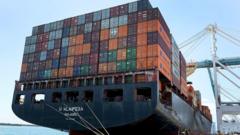In a recent analysis, the World Trade Organization (WTO) has signaled a concerning forecast for global trade trends in 2023, attributing the anticipated downturn primarily to the tariffs imposed by US President Donald Trump. The WTO suggests that not only is a contraction in trade expected, but there are also significant risks such as reciprocal tariffs and political unrest that may exacerbate the situation.
US Tariffs Projected to Shrink Global Trade, Warns WTO

US Tariffs Projected to Shrink Global Trade, Warns WTO
The World Trade Organization predicts a decline in global trade due to US tariffs, with significant implications for different regions.
As the WTO revealed, the United States is likely to experience the steepest drop in trade, particularly in North America, where they project a decrease of over 10%. Ngozi Ikonjo Iweala, director general of the WTO, expressed serious concern regarding the "decoupling" between the US and China, describing it as a "phenomenon that is really worrying." Initially, the WTO had forecast a growth of 2.7% in global goods trade by 2025, a figure now adjusted to a slight decrease of 0.2%.
Ralph Ossa, the chief economist at the WTO, elaborated on the unintended consequences of tariffs, noting that uncertainty in trade policies significantly hampers trade flows and economic health. The US enacted a baseline tariff of 10% on a wide range of foreign imports as of April 5; despite some exemptions for specific goods and countries, the overall impact is expected to be severe. Meanwhile, China faces even more stringent tariffs reaching as high as 145% on most imported goods.
Stock markets in the US have begun to react negatively amidst ongoing uncertainties, with declines observed across major indices. However, the WTO anticipates that some regions, notably Asia and Europe, may still experience modest growth in trade. The report also, for the first time, includes predictions related to services trade and anticipates a growth of 4% by 2025, a slight dip from earlier projections.
During his presidency, Trump has frequently shifted his stance on tariff strategies. He argues that these measures will bolster domestic consumption of American-made products, increase tax revenues, and spur considerable national investment. Critics, however, caution that reversing decades of manufacturing outsourcing is a complex challenge that might exacerbate immediate economic struggles. Following a wave of backlash, Trump placed a temporary 90-day pause on tariffs affecting many of America's trading partners, with the exception of China.
Several economists, including the governor of the Bank of England, have warned that such tariffs could lead to reduced disposable income for UK consumers, underscoring the broad-reaching consequences of US trade policy.
Overall, the WTO's report highlights a period of uncertainty and risk, with global trade undergoing significant transformations as policy decisions unfold in the United States and beyond.
Ralph Ossa, the chief economist at the WTO, elaborated on the unintended consequences of tariffs, noting that uncertainty in trade policies significantly hampers trade flows and economic health. The US enacted a baseline tariff of 10% on a wide range of foreign imports as of April 5; despite some exemptions for specific goods and countries, the overall impact is expected to be severe. Meanwhile, China faces even more stringent tariffs reaching as high as 145% on most imported goods.
Stock markets in the US have begun to react negatively amidst ongoing uncertainties, with declines observed across major indices. However, the WTO anticipates that some regions, notably Asia and Europe, may still experience modest growth in trade. The report also, for the first time, includes predictions related to services trade and anticipates a growth of 4% by 2025, a slight dip from earlier projections.
During his presidency, Trump has frequently shifted his stance on tariff strategies. He argues that these measures will bolster domestic consumption of American-made products, increase tax revenues, and spur considerable national investment. Critics, however, caution that reversing decades of manufacturing outsourcing is a complex challenge that might exacerbate immediate economic struggles. Following a wave of backlash, Trump placed a temporary 90-day pause on tariffs affecting many of America's trading partners, with the exception of China.
Several economists, including the governor of the Bank of England, have warned that such tariffs could lead to reduced disposable income for UK consumers, underscoring the broad-reaching consequences of US trade policy.
Overall, the WTO's report highlights a period of uncertainty and risk, with global trade undergoing significant transformations as policy decisions unfold in the United States and beyond.

















